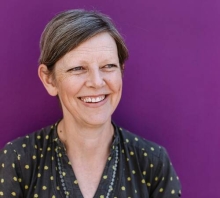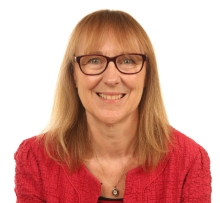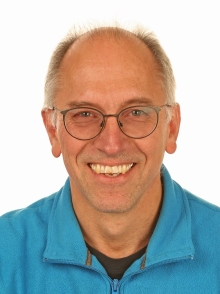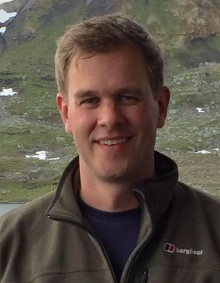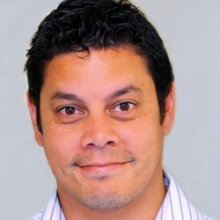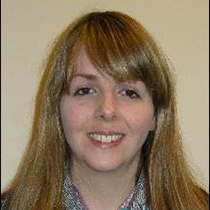
Teaching | Research | Facilities | Our staff | News and blogs | Explore our Faculty | Contact us
In the School of the Environment and Life Sciences, we study how our planet works, how it's changing and what we can do about it. From finding new ways to combat climate change to our pioneering research into plastic-eating enzymes, we're turning our expertise into action.
We cover all aspects of biological and environmental science, from developmental biology and epigenetics, molecular biophysics, marine biology and applied environmental research, to palaeontology, geology, geotechnical engineering and geography.
Our academics are experts within their fields and conduct impactful research and innovation that informs our relevant and engaging teaching. We're committed to teaching our students through practical lessons and fieldwork, so they can learn from our experts, first-hand.
Teaching
We emphasise personalised study and high levels of interaction and collaboration between lecturers and students. Our research activities frequently inform our teaching, and our graduates develop the ability to apply the skills they learn during their study.
We provide high levels of student support and guidance in a nurturing environment. Our researchers and teaching staff share their passion and excitement for research to inspire the scientists of the future.
Learning on location
Students learn on residential fieldwork trips to Malta, Berlin, the Jurassic Coast, Somerset and the Isle of Wight. Self-funded trips to Lapland in Finland, Portugal, Malaysia, and Hong Kong are also available. We've also developed study exchange opportunities with universities in Spain, France, Australia and Canada.
Our students run tests and simulations in the same labs used by our research staff. We love guiding students to get to grips with exciting practical techniques including gamma spectrometry, crystal growth, low temperature physics and environmental monitoring.
Student integration
Cooperation and working with students actively shapes our teaching and assessment. Staff operate an open door policy, so students can look for guidance and support whenever they need it, and we encourage them to build networks and study groups with peers during their time at Portsmouth.
We work closely with the Students' Union Student Voice representatives to get regular feedback from students. We also run mid-term staff and student meetings to check in on how we're doing.
Employability
We have strong links with industry and often undertake site visits and invite industry experts as guest speakers. All of our courses within the School of the Environment and Life Sciences offer the opportunity to undertake a placement year in industry or to study abroad.
Many of our courses are accredited by relevant professional bodies, so employers know that our students are highly skilled and job ready. Accreditation bodies include the Royal Society of Biology, Palaeontology Society, Institution of Environmental Sciences (IES), Royal Geographical Society, the Geological Society and the Institute of Materials, Minerals and Mining (IMMM).
Our teaching areas
Explore the undergraduate and postgraduate degrees we offer within the following areas.
Biological sciences courses
Get a deep knowledge of the natural world on our biological sciences courses, learning how to harness the earth and combat biological threats to humanity.

Earth sciences courses
Study the planet we live on – how it was formed, how to manage disasters and solve the world's pressing problems on one of our Earth Sciences degrees.

Geography and environmental science courses
Explore the scientific processes and physical structures of the natural world, and our effect on them, on one of our Geography and Environmental Science degree courses.
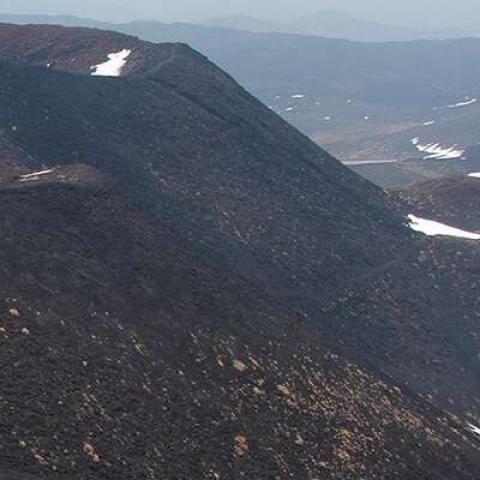
Research
Our research in environment and life sciences aims to provide solutions to complex global challenges. It makes a positive impact at the local, national and international level.
The Research Excellence Framework 2021 rated Units of Assessment that include our research areas - Allied Health Professions, Dentistry, Nursing and Pharmacy, Earth Systems and Environmental Sciences, and Geography and Environmental Studies.
Within Allied Health Professions, Dentistry, Nursing and Pharmacy, more than 80% of our research was rated as world-leading or internationally excellent in terms of originality, significance and rigour. 100% of our impact case studies were rated as outstanding or very considerable in terms of their reach and significance.
Across Earth Systems and Environmental Sciences and Geography and Environmental Studies, our research was rated as having impact that was outstanding or very considerable in terms of its reach and significance. Our impact case studies evidenced societal benefits in areas such as water quality monitoring, management of the Chernobyl exclusion zone and improving the wellbeing of international women migrants and their families in Indonesia.
Working with researchers across the globe, we have developed techniques that address the growing issue of plastics and how to deal with their negative impact on the environment. This research lead to our Centre for Enzyme Innovation being awarded £5.8 million for its research into plastic eating enzymes.
Partnerships and funding
We work with a wide range of organisations to help solve environmental and societal challenges, and work towards achieving the United Nations' Sustainable Development Goals. These important partnerships include local to international companies, government agencies, NGOs and charities.
Our research is funded by research bodies including the Natural Environment Research Council (NERC), Science and Technology Facilities Council (STFC), Royal Society, European Commission, Economic and Social Research Council, and The Leverhulme Trust.
Our research centres
Much of our exceptional research takes place within the following cross-disciplinary research centres.
Centre for Enzyme Innovation
At the Centre for Enzyme Innovation, we are working to solve one of the most pressing environmental issues facing our planet.

Institute of Life Sciences and Healthcare
Our multidisciplinary research environment supports the translation of science for societal benefit.

Centre for Blue Governance
We're committed to the protection, restoration and sustainable governance of our aquatic environments

European Xenopus Resource Centre (EXRC)
Discover the world’s largest Xenopus research facility and access different Xenopus specific resources, including antibodies, wild-type strains, DNA resources and egg extracts.

Centre for Applied Geosciences
At the Centre for Applied Geosciences, we're investigating natural and manmade hazards and geo-heritage conservation.

Heritage Hub
The Heritage Hub brings together researchers and professionals from across the university to tackle key issues in heritage and heritage conservation locally, nationally and internationally.

Our research groups
Explore the work we're doing across our research groups.
Biophysics and Molecular Genetics Research Group
We're studying biomolecules such as DNA, RNA and proteins to allow us to tackle issues such as disease, pollution and energy.
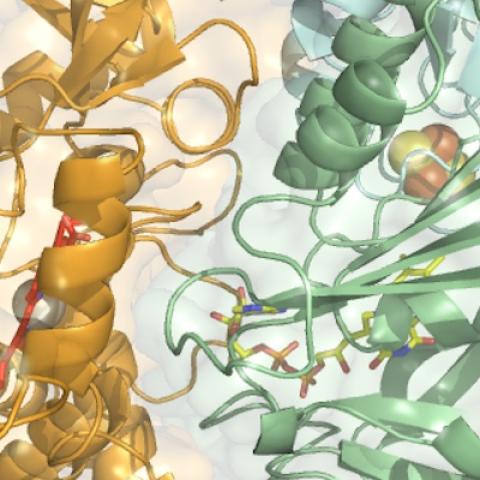
Ecology and Evolution Research Group
We're expanding knowledge of the diversity of the living world, from molecules to ecosystems, and creating a basis for assessing and reversing the extinction of species.

Marine Biology Research Group
We're researching key environmental issues in marine science such as climate change, biodiversity loss, habitat degradation and ocean acidification.

Crustal Evolution and Tectonics Research Group
We're addressing fundamental questions about the Earth's systems, such as when plate tectonics began operating and how changes in the style and rate of plate movement can be documented through time.

Environmental Processes and Impacts Research Group
We're looking at the Earth's changing environment and the influence of human activity on climate and ecosystems.

Palaeontology and Environmental Change Research Group
We're exploring how fossil records can help us understand past climates and environments, and effectively predict and model climate change and its impact on the Earth’s ecosystems.
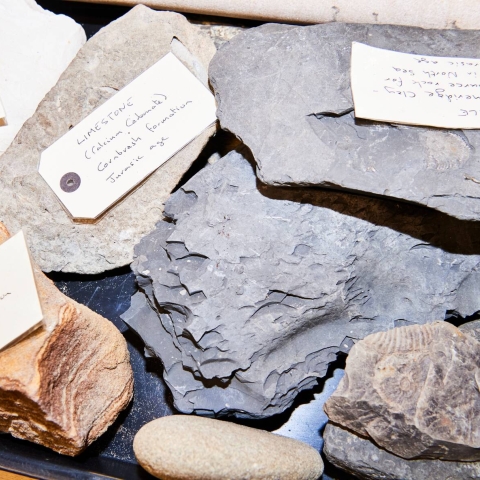
Risk Reduction and Resilience Research Group
Discover how our research manages risk and is seeking more effective ways to build resilience.

Our research projects
-
Water quality monitoring in the Kishon River catchment using Chemcatcher passive sampler
We developed an improved passive water sampler, used to monitor water quality across the globe. The creation and uptake of the Chemcatcher has lead to the development of national and international standards for the use of passive samplers. It's been used to measure levels of pharmaceutical pollutants all the way to radioactivity in water after the Fukushima nuclear incident.
This project involved deployment and analysis of Chemcatcher passive samplers in the Kishon river catchment, Israel. Screening and quantification for pesticides and pharmaceuticals.
-
The wildlife at Chernobyl
We've assessed the radiosensitivity of animals in the Chernobyl Exclusion Zone and created sustainable ways to develop the area, including the creation of Atomik vodka.
Facilities
We have a wide range of state-of-the-art facilities within the School of the Environment and Life Sciences (ELS). The videos below showcase these facilities under the two former schools that combined to become ELS.
School of the Environment, Geography and Geosciences facilities
Discover the facilities available within the School of the Environment, Geography and Geosciences.
James Darling: Here in the school, we have a wide range of outstanding research facilities which allow us to really tackle major challenges and problems in Earth and environmental sciences.
Some examples of those facilities include the Electron Microscopy and Microanalysis Unit, where we have specialist, high resolution microscopes and facilities for studying materials at great detail.
We have laboratories like the rock mechanics laboratory, soil mechanics, environmental chemistry laboratories, including specialist computing facilities for remote sensing.
The laboratory facilities we have are essential to the research that we do, and they allow us to really understand how different materials have formed and evolved through time.
They allow us to monitor environmental processes and try and use that data to predict how the earth may change in the future.
Something we're really proud of in this school is that we train all of our students from undergraduate through to Master’s and postgraduate students on how to not only use the instruments but how to interpret data from them as well.
We do work very closely with many companies who come and use our facilities or support projects using these facilities.
Because we have equipment that's really quite unique and specialised, companies can come to us with a problem and we can use our expertise and our facilities to help them solve that problem.
So it's very exciting for the research students to work on problems which have that very clear application in the real world.
The MRes and PhD students get a really hands-on, really exciting, dynamic environment to work in.
They're treated in the same way that staff are in terms of the training they receive, using a lot of world-class facilities, and that's part of our ambition to train our students to become leaders in solving environmental and societal challenges and equipping them with the tools they need to do that.
School of Biological Sciences facilities
Discover the facilities available within the School of Biological Sciences.
Video with no dialogue, showing the facilities within the School of Biological Sciences at the University of Portsmouth: School of Biological Sciences, Experimental Aquarium Rooms, Seawater System for Research and Offshore Research.
Environmental Chemistry Analysis Laboratory
Use the equipment in this lab to identify and analyse chemicals and biochemicals in surface water, groundwater and soil, so you can develop strategies to minimise and remove their harmful environmental effects.

Institute of Marine Sciences
Explore the marine ecosystems of the Solent European Marine Site at our shoreside marine station, complete with floating research platform, £2 million aquarium and laboratory suite.

Mass Spectrometry and Laser Ablation Laboratory
Investigate the geological and planetary processes that influence environment change and natural resource formation in this lab, using our industry standard spectrometers and laser ablation system.

Our staff
ELS news and blogs
Latest news
View all news
New research shows how Londoners used death data to survive the plague
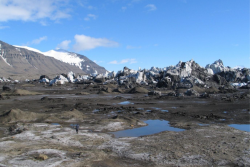
New research reveals how warming climate is changing “troublesome” glacier behaviour

Scrumpy the corgi to embark on one final adventure with her late best friend
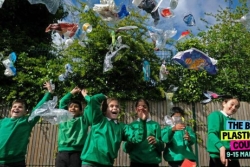
Revolution Plastics Institute partners with Everyday Plastic for the UK’s largest plastic waste survey
Latest blogs
View all blogs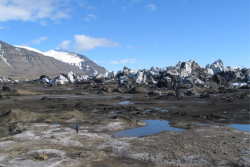
Some glaciers can suddenly surge forward – with dangerous consequences
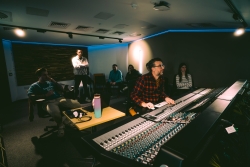
Local band Crystal Tides record debut album at the University of Portsmouth studios

The five most romantic paintings of all time – according to art historians
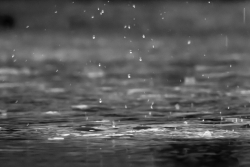
Ten classic films that used rain to transform a scene
Explore our faculty
Explore the other schools and departments that make up our Faculty of Science and Health.
Faculty of Science and Health
Explore the Faculty of Science and Health at the University of Portsmouth, and learn more about the teaching and research activities that take place within the Faculty's different departments and schools.

School of the Environment and Life Sciences
In the School of the Environment and Life Sciences, we're addressing the most pressing issues impacting people's quality of life around the world.

School of Medicine, Pharmacy and Biomedical Sciences
Through our teaching and research, the School of Medicine, Pharmacy and Biomedical Sciences strives to find new ways to help those with debilitating illnesses and diseases.

School of Psychology, Sport and Health Sciences
Discover the School of Psychology, Sport and Health Sciences, where we're exploring health and exercise science, sport science, and the impact of psychology.

School of Dental, Health and Care Professions
Discover the School of Dental, Health and Care Professions' commitment to the health and care sector through innovative teaching and research activities.

Contact us
To get in touch, please contact our Admissions office.

